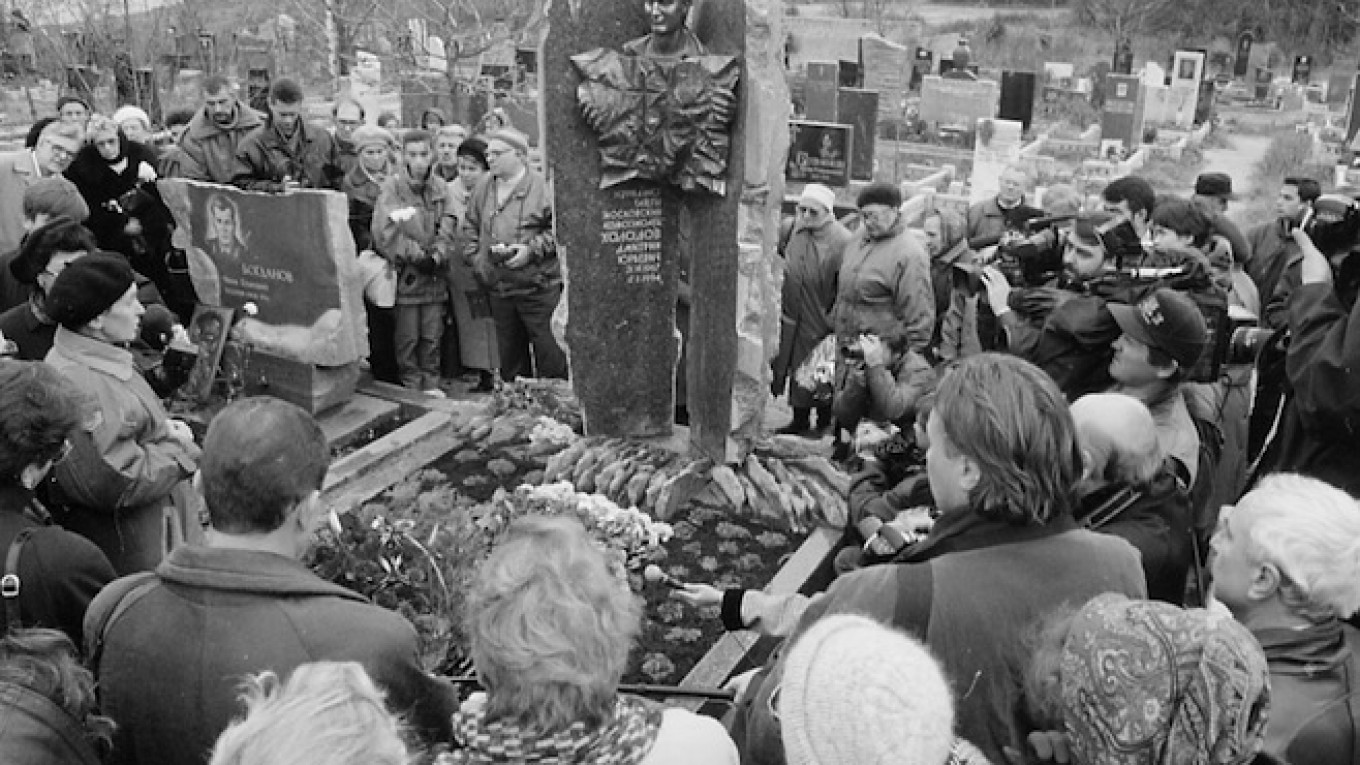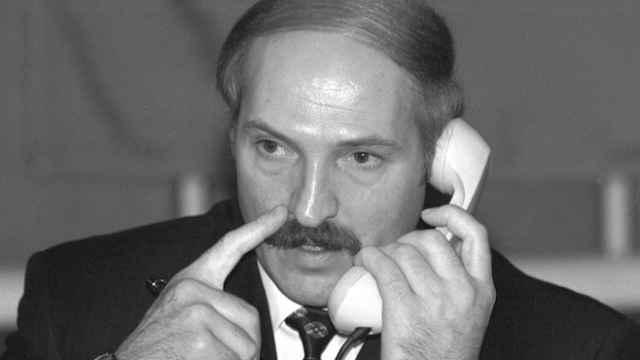Twenty years after investigative reporter Dmitry Kholodov was killed by a booby trap bomb — the first high-profile assassination of a journalist after the fall of the Soviet Union — we look back at his funeral.
This article was taken from the Moscow Times archive and was first published on Oct. 21, 1994.
Thousands of mourners braved the cold Thursday to pay their final respects to investigative reporter Dmitry Kholodov, who was killed this week by a booby trap bomb, and demanded the resignation of Defense Minister Pavel Grachev.
An emotional throng of some 5,000, many bearing flowers and carrying photographs of the slain Moskovsky Komsomolets reporter, filed silently past the coffin of Kholodov, his face barely visible through the white cloth that covered it.
Kholodov, 27, had been investigating corruption at top levels of the military before he was murdered Monday and had shortly been due to reveal his findings to the State Duma's committee on defense.
As mourners flowed into Moscow's Palace of Youth, Kholodov's colleagues and many top officials paid tribute to him outside, among them presidential spokesman Vyacheslav Kostikov and reformist leader Yegor Gaidar.
"We will avenge but we will not blow up and kill, we will write the truth about the cynics and scoundrels which exist in our state," Pavel Gusev, Moskovsky Komsomolets' editor-in-chief said. "We are not afraid of terrorists from different secret services of the Defense Ministry."
Part of the crowd picked up Gusev's chant of "Grachev must resign!" referring to the defense minister who was among those military officers Kholodov was investigating and whom Gusev accused of complicity in the murder.
Gusev said Kholodov's research had led both to Grachev and to his deputy Matvei Burlakov, former head of the Western Group of Forces, the command of the Soviet Army that controlled the garrisons in Eastern Europe.
President Boris Yeltsin, who was in St. Petersburg on Thursday, defended Grachev, warning journalists "not to subject the army and the Ministry of Defense to a stream of subjective information and mud."
The president also proposed introducing special licenses for journalists investigating crime and corruption in an effort to provide them with greater protection, Interfax reported, although he did not give details of the plan.
Kostikov said Kholodov had known that to save Russia and democracy it was necessary to speak the truth.
"What has happened to Dima is an attempt to toss a suffocating scarf of lies on honest journalism," Kostikov said. "The most dangerous thing is that now journalists may be scared by terrorists and may stop telling the truth."
Kholodov died on opening a briefcase that a source had told him to collect from the luggage check at the Kazan railway station, and which he believed would contain documents he had long been seeking related to his investigation of the Western Group of Forces.
But the effect of Monday's blast seemed to do anything but frighten journalists who attended Kholodov's funeral.
"If they were counting on scaring journalists, they grossly miscalculated," said Pavel Guntiontov, chairman of the Committee on the Rights of Journalists. "On the contrary, the attack had an entirely different effect."
The attack on Kholodov appeared to unite a press corps that is not known for cooperation. Most of Russia's major dailies carried tributes to Kholodov Thursday, even those papers that lie at opposite ends of the political spectrum from Moskovsky Komsomolets, such as Pravda and Sovietskaya Rossiya.
Even as the media is putting its heroic foot forward, newspapers have no choice but to consider beefing up security in light of this unprecedented attack in their own back yard.
Guntiontov met Thursday with a private security firm to discuss offering safety seminars for journalists who cover hot spots and investigate sensitive subjects.
Still, many journalists are wary that the attack on Kholodov could launch a new wave of violence against journalists who prove too persistent.
"As long as the current authorities remain in power, nothing will change. All journalists will be powerless idiots," said Alexander Kakotkin, a reporter for Moskovskiye Novosti.
A Message from The Moscow Times:
Dear readers,
We are facing unprecedented challenges. Russia's Prosecutor General's Office has designated The Moscow Times as an "undesirable" organization, criminalizing our work and putting our staff at risk of prosecution. This follows our earlier unjust labeling as a "foreign agent."
These actions are direct attempts to silence independent journalism in Russia. The authorities claim our work "discredits the decisions of the Russian leadership." We see things differently: we strive to provide accurate, unbiased reporting on Russia.
We, the journalists of The Moscow Times, refuse to be silenced. But to continue our work, we need your help.
Your support, no matter how small, makes a world of difference. If you can, please support us monthly starting from just $2. It's quick to set up, and every contribution makes a significant impact.
By supporting The Moscow Times, you're defending open, independent journalism in the face of repression. Thank you for standing with us.
Remind me later.






